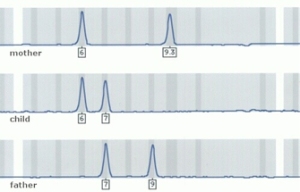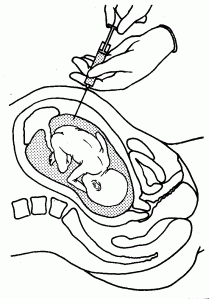Paternity testing in a pregnant female can be problematic because to perform a definitive paternity test you must have DNA samples from the mother, the father, and the child. After birth this is simple since easily obtainable buccal swabs can be used to obtain DNA from all 3 parties.
But what if this is prenatal? Obtaining fetal DNA requires amniocentesis, an invasive procedure where a needle is inserted through the woman’s abdomen and into the uterus. Amniotic fluid, which contains fetal cells and DNA, can then be removed for testing. This is a safe and easily performed procedure but isn’t without complications such as inducing premature labor, introducing infections, and rarely directly damaging the fetus.
Now it seems that the folks at DNA Diagnostics Center in Fairfield, Ohio, a company that is a major provider of paternity testing materials, has come up with a technique that might preclude the need for amniocentesis. During pregnancy some of the fetal blood sneaks into the maternal circulation and therefore can be sampled along with the mother’s blood with a simple blood test. This new technique then allows the “subtraction” of the maternal DNA profile from the DNA profile found in the blood leaving behind what must be the fetal DNA pattern. Then sampling DNA from the suspected father would give the needed DNA from all 3 individuals to perform the paternity testing.
If this technique works and passes further scrutiny it promises to change prenatal paternity testing for the better.



























Laura Mitchell
October 16, 2011 at 10:51 am
For those of us who are Rh negative, does receiving Rhogam during pregnancy affect the test?
LikeLike
D.P. Lyle, MD
October 16, 2011 at 1:53 pm
No it won’t change your RH type but it blocks the sensitization antigen-antibody reaction that can occur during pregnancy with a Rh + fetus.
LikeLike
Brenda
October 17, 2011 at 4:09 pm
How interesting!
I am curious how distant (not first) double cousins can test out whether they have two or three or four shared lines. Sounds like this might help in that kind of thing?
LikeLike
D.P. Lyle, MD
October 18, 2011 at 10:03 am
This would be familial DNA testing which was used in the famous Grim Sleeper case. Close relatives have many DNA components in common so their profiles can be similar. So if a crime scene sample is found to be similar to a suspect but not a true match it could mean that the actual perpetrator is a close relative–brother, father, etc.
LikeLike
Brenda
October 19, 2011 at 5:24 pm
THANKS!!!!!
LikeLike
EEG
October 17, 2011 at 5:57 pm
Could this replace amniocentesis in genetic test screenings as well?
LikeLike
D.P. Lyle, MD
October 18, 2011 at 10:00 am
It might be able to helping that arena but full genetic testing that is reliable would likely still require amniocentesis to get good samples. Maybe in the future though.
LikeLike